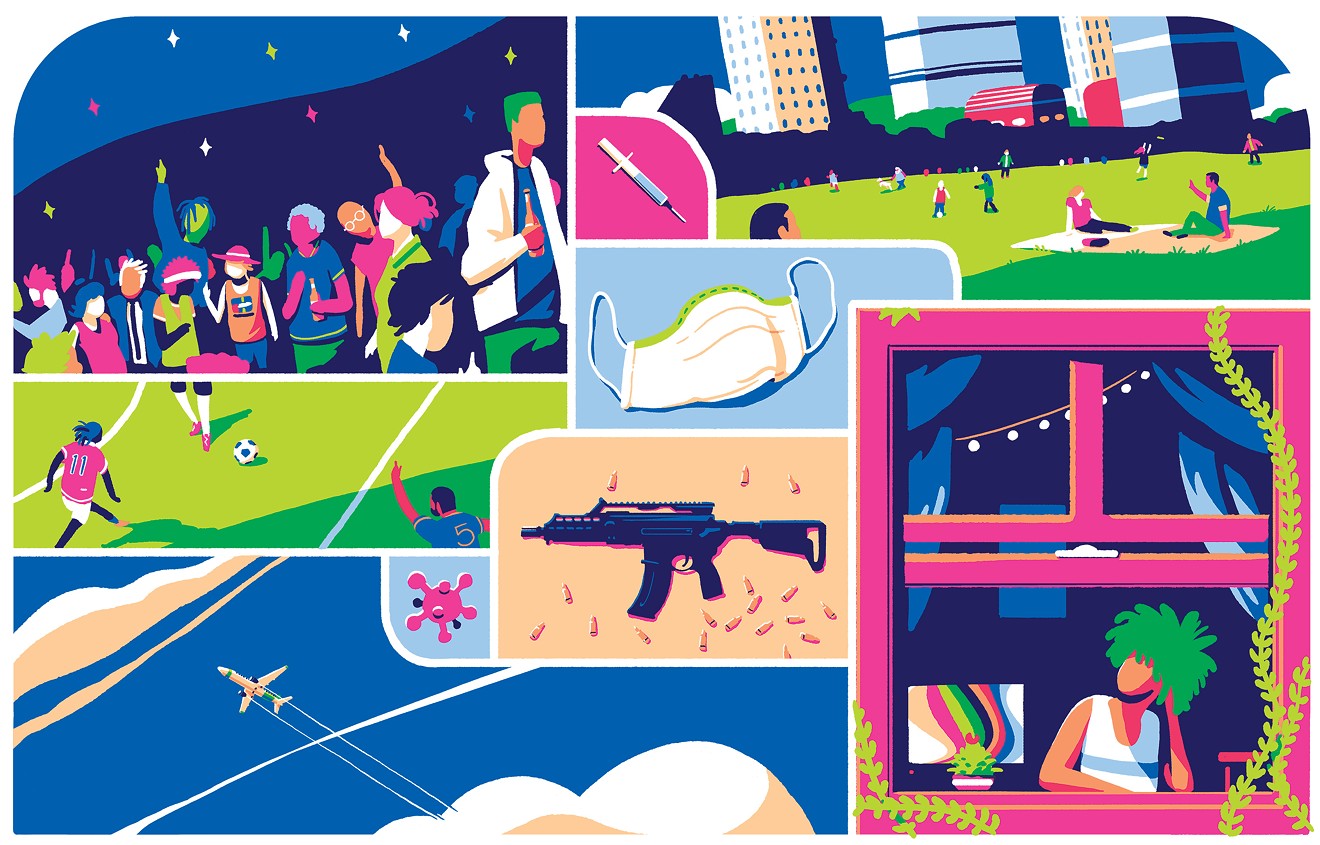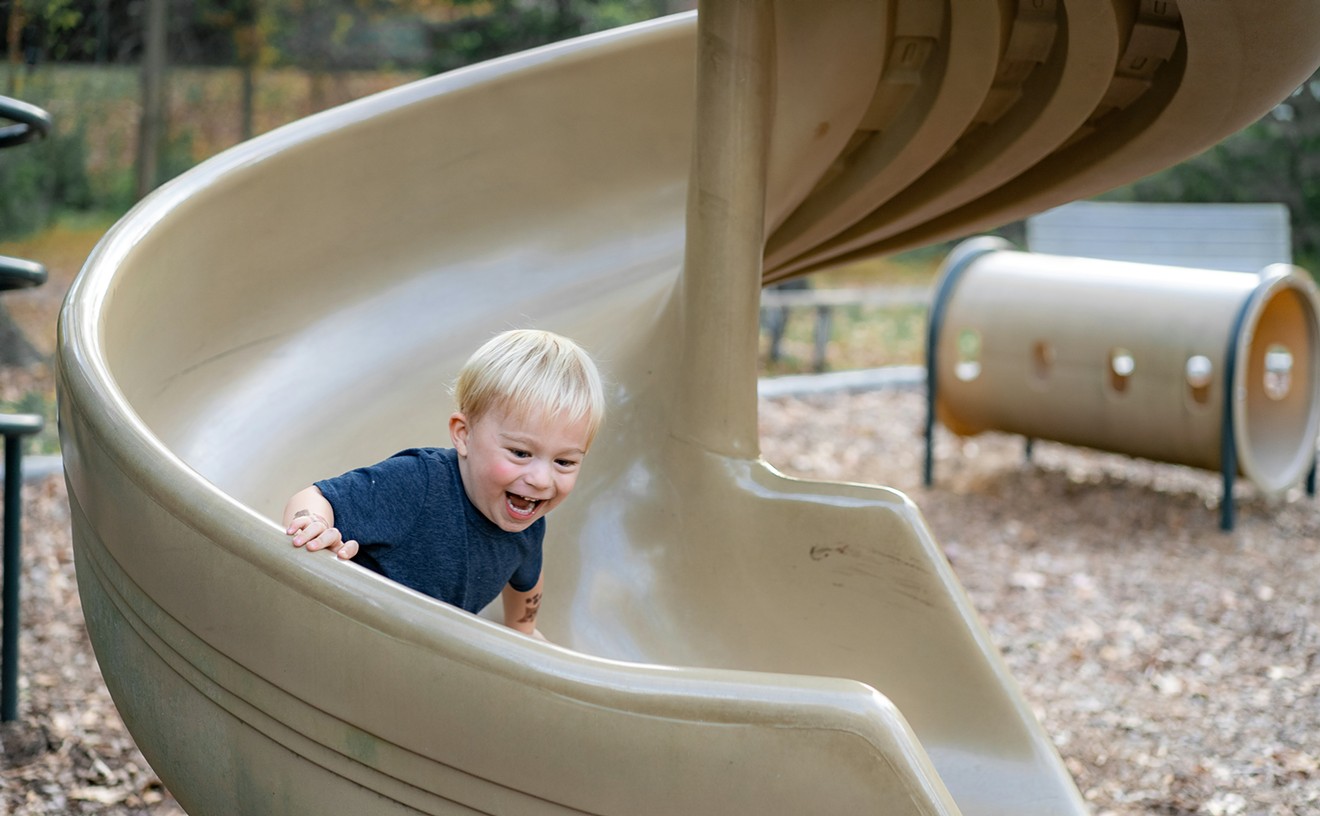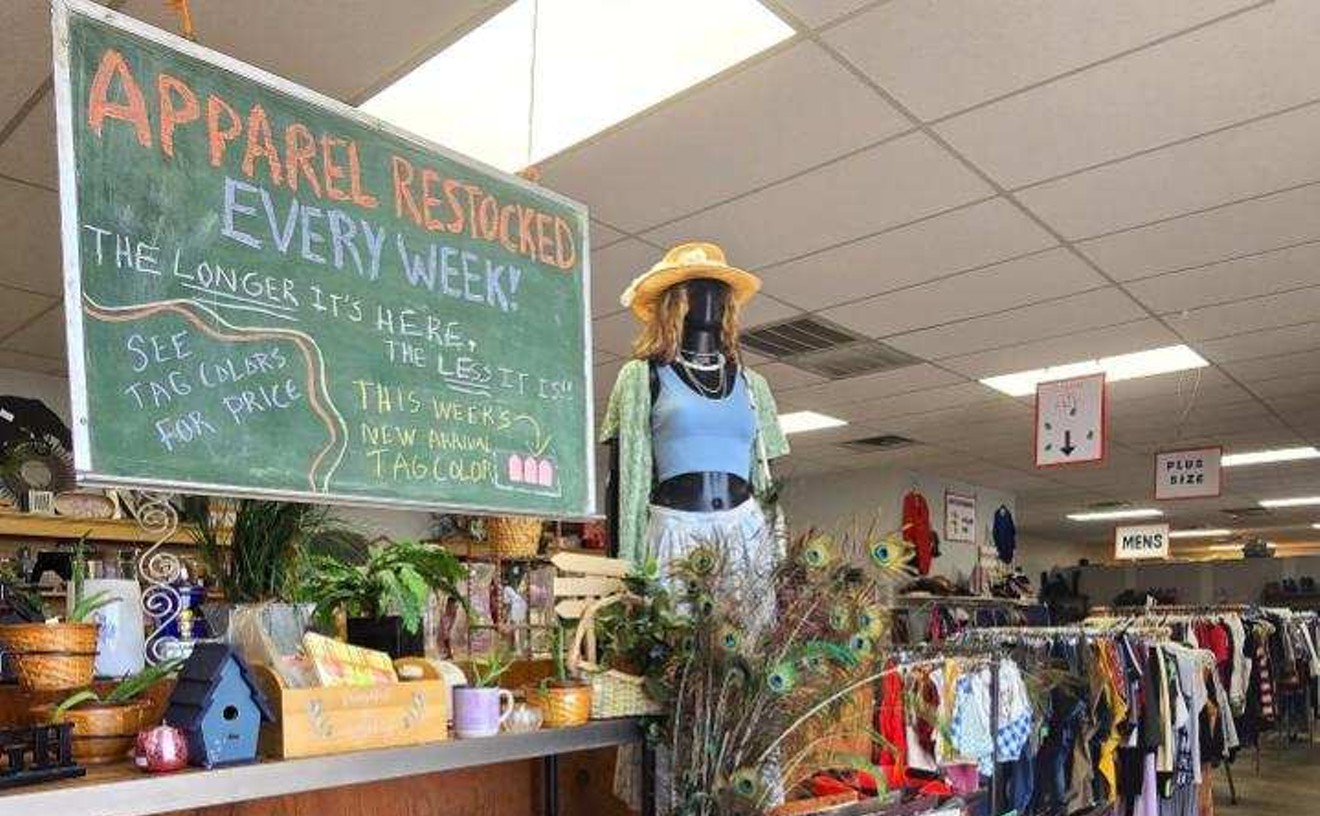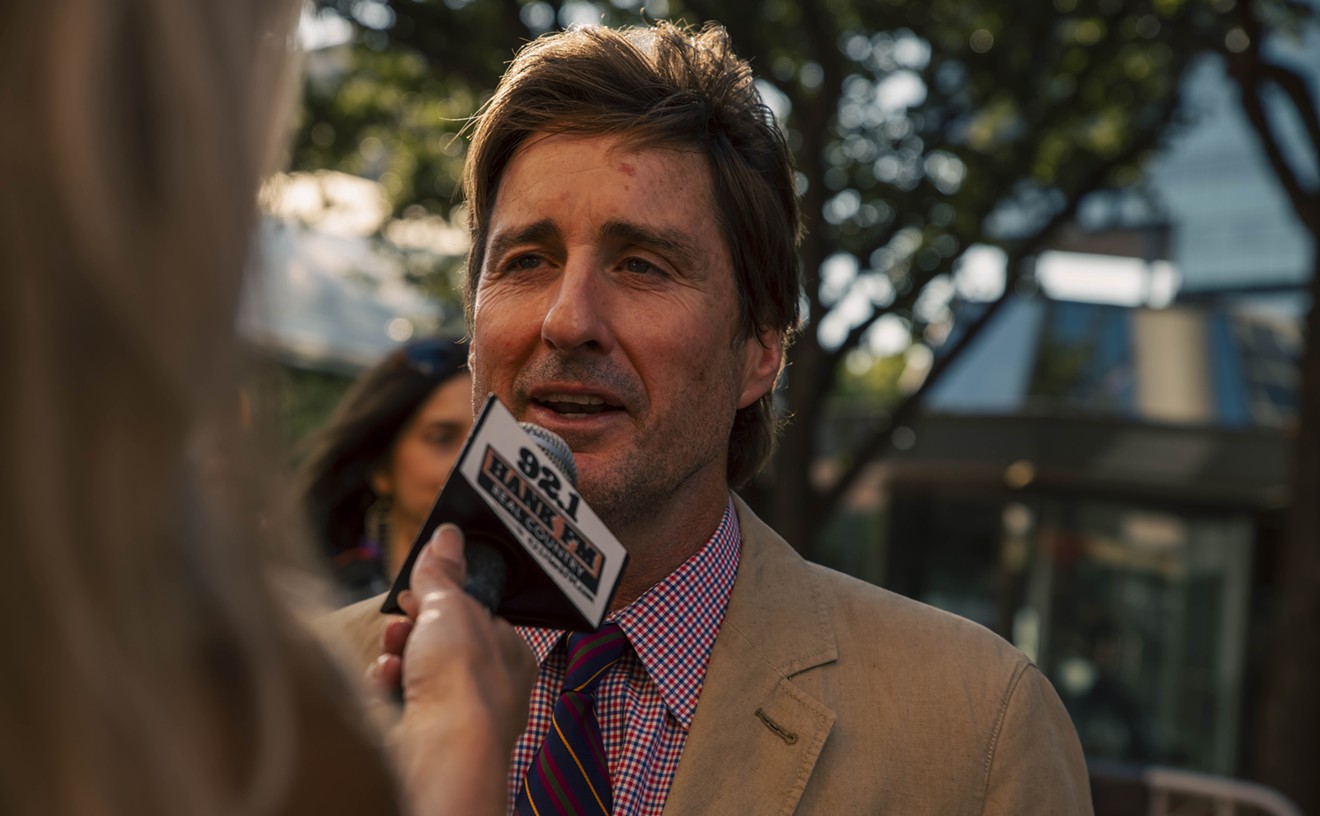Not quite.
No one willed the pandemic and its widespread death and suffering into existence. Still, for some people, especially those with anxiety disorders but others as well, the prospect of returning to normal life causes almost as much stress as the pandemic itself. But that’s normal, experts say.
Adjusting to the pandemic was hard no matter one's circumstances, yet we were able to accept the new health guidelines. Even those without anxiety found some unexpected benefits from the new era. Call it pandemic privilege, forced positivity or an odd variant of Stockholm syndrome, but many find charm in our new shared lifestyle. It gives some a chance to sleep a tad later and others a ready excuse to avoid obligations or to explain their failure to live up to their potential. Conversations have become real and philosophical. We spend more time at home with our families.
We get to wear sweatpants days on end.
For others, staying at home means living with fewer fears of the daily perils of existence, like car crashes — though there weren’t any fewer of them in 2020. People with anxiety and obsessive-compulsive disorders, in particular, were spared constant exposure to the things that trigger stress or phobias, whether germs, flying, crowds or awkward conversations with strangers.
If that sounds like a ridiculous tradeoff for enduring the pandemic, then congratulations: You're probably not among the 40 million (18.1%) of Americans who experience an anxiety order each year, according to the Anxiety and Depression Association of America. Panic disorder, obsessive-compulsive disorder (OCD), post-traumatic stress disorder (PTSD), generalized anxiety disorder (GAD) and phobias are all anxiety disorders, which are often accompanied by depression and other ailments.
"... Anxiety disorders place a significant economic impact on the US healthcare system. The total annual cost of anxiety disorders has been estimated to be between $42.3 billion and $46.6 billion, of which more than 75% can be attributed to morbidity, mortality, lost productivity, and other indirect costs," according to a report in The American Journal of Managed Care.
Even before the pandemic, Americans reported growing levels of anxiety, according to an American Psychiatric Association poll in 2018, and perhaps for good reason. In 2019, there were more mass shootings in the U.S. than there were days in the year: a total of 417, according to the nonprofit Gun Violence Archive. While 2020 was rarely open for business, the number of mass shootings rose to 578 by the end of November.
Before the pandemic, the effect of mass shootings was felt even among the non-anxious. A study conducted in August 2019 by the American Psychological Association found that more than three-quarters of Americans experienced stress related to potential mass shootings, while one-third made lifestyle adjustments to avoid exposure to crowds.
Kat C., a North Texan pursuing a degree in education in Massachusetts, said that before the pandemic she was treated for social anxiety and agoraphobia stemming from fear of potential catastrophes such as mass shootings or fires.
“I would say a general concern about all of those sorts of things,” she said, “just the fear of being trapped by a lot of people unable to get out for any emergency reason.”
Even in normal times, Kat, who spoke to us provided we didn't give her name, avoided large crowds. When she couldn’t, she planned an exit strategy.
“Especially movie theaters and malls,” she said. “And if I did go, I would make a plan with the people beforehand, like I would do this with family members and friends, I would say, ‘OK, if something happens, we'll do this and go to this exit.”
Kat said her anxiety has been reinforced in the pandemic era.
“I, pre-pandemic, already had and dealt with social anxiety,” she said. “Now that has been greatly exacerbated. I am deeply concerned about going out and interacting with people who are showing such a lack of empathy on a basic level with their actions and blowing this up into what it has been.”
Kat said that during a recent road trip back home, she stopped as infrequently as possible because every gas station along the way didn’t seem to enforce mask-wearing.
“At this stage in the pandemic, it's been nearly a year, and so many people have died and still people are not willing to concede even that much in their daily lives,” she said. “That's making me very pessimistic and scared about going out and interacting with people.”
While mask-wearing alleviates some of her anxieties, she said she’s still worried about the prospect of a post-pandemic future, even one where masks aren’t needed at all.
“This has increased my anxiety that such a thing could happen again, and people will handle it equally badly and with an equal lack of general respect for each other's lives,” she said. “To put it mildly, this is not very encouraging for my interactions with people going forward.”
The pandemic habits of others are also something that worries Paige Skinner, a longtime Dallas Observer contributor and former staff member, who said the transition to a post-pandemic world fills her with anxiety and has caused her to reconsider friendships and future relationships.
“How are we gonna go back? It stresses me out so much,” Skinner said. “Now I know how certain people live through a pandemic, and I now know that some people didn't take it as seriously as I did. And some people still did things that I think put them in compromising situations. And they were selfish.”“For people who were already inordinately afraid of disease and wash their hands 20 times a day and that kind of thing, this has, I think, validated that kind of way of thinking about and feeling about the world, even to the point of irrationality." – Dr. Scott Thornton
tweet this
Skinner moved in with her parents when the pandemic began and has stayed home for the entire year. Seeing other people “flaunt” their outings on Instagram is not something she’ll be able to get past easily, she said. In the future, she’ll consider people’s pandemic behavior as a measure of ethics, a compatibility question akin to one’s voting history.
“So now when I date, I'm gonna have to say, ‘Who did you vote for? Who did you vote for in the primaries? And how seriously did you take this pandemic?’" she said. "Because I don't want to date a guy who is at bars right now.
“It's kind of like, you know, even though Trump's not president anymore, I still will forever know the people who voted for him, and that's not a good feeling to have,” she continued. “I now forever know that you were outwardly a racist and a sexist. And now I now forever know that you thought your hangouts were more important than my elderly parents’ health.”
Skinner noted how “lucky” she is to have been able to spend a peaceful time at home where she was able to take a pause from adult responsibilities like paying bills and looking for work.
“I definitely feel bad, because obviously I do want the pandemic to end, and I am obviously devastated that more than, what is it, 400,000 Americans have now died,” she said. “And I desperately want things to go back to normal. But I think just for me, now I've gotten into a routine of dealing with it.
“I'm privileged enough to say this: Life has kind of been put on pause for a year, which has obviously been horrible and annoying and a pain in the ass,” she said. “But there's been a nice break to it, like, when the pandemic is over, I'm gonna have to figure out what I'm doing with my life again. And going back to how things were before or going toward a new normal will just be difficult because change is just difficult."
Skinner hasn't lost anyone close to her from COVID, and for her and others who were able to stay at home, adjusting to the pandemic came easier. The acknowledgment of that pandemic privilege often comes with a side of guilt.
“I actually do feel like an asshole for saying it because so many people are suffering,” Skinner said. “ And I want all of that to go away. Just like the pandemic was a change, it'll just be another change to have to adjust to. And I'm a person who, like, doesn't really adjust to change that well.”
People like Skinner and Kat C. are far from alone. Having adapted to life during the pandemic, the idea of adjusting again to a new reality can be as overwhelming as the beginning of the pandemic's restrictions last year.
"It's not surprising, anytime somebody experiences trauma, to have a degree of hypervigilance and increased anxiety surrounding any kind of trigger related to that trauma,” said Dr. Molly Martinez, a Dallas therapist who specializes in anxiety and OCD.
Events like mass shootings can bring forth forms of PTSD, even when we only “witness” these traumatic events through news media or “by experiencing it at the society level,” she says.

Dr. Molly Martinez says COVID is a national trauma, so it's natural it might cause anxiety.
Mike Brooks
While it may seem paradoxical, fearing the pandemic’s ending, as well as its continuing, is a natural result of suffering yet another radical change in our lives.
“Any time we are asked to change our lifestyles, that's a hard thing to do,” Martinez said. “Behavior change is really hard. And there's a lot of uncertainty about 'Well, how am I gonna do this now?'
“One of the cores of anxiety disorders and OCD, which are my specialties, is an intolerance of uncertainty,” Martinez explained. “When you start out already anxious, you have a low threshold, typically, for what's gonna happen. Some people look at uncertainty and they think, 'This is cool. I have no idea. It's gonna be a surprise. We'll see how this goes.' And for some people, that's terrifying.”
Those who suffer from disorders like OCD and anxiety are now unable to receive the exposure therapy they need and are out of practice with facing their fears, which will put them at a disadvantage when the pandemic is over, she said.
“Your brain is wired in such a way that the safety learning that comes with doing something you're afraid of over and over again fades in a way that the danger associated with that particular activity does not,” Martinez said. “So what happens is you're out of practice with the exposure, your safety learning you kind of forget it. But that more primitive part of your brain that says it's unsafe, it's still there.”
The lack of safety learning Martinez described is one issue raised by Kat, who said she’s able to teach remotely for now but isn’t looking forward to rejoining in-person classrooms.
“As a possible return gets closer, I think these fears will be more acute,” she said.
Dr. Scott Thornton, who’s been treating disorders like anxiety in Dallas since 1988, said there are “real dangers that we've been able to shelter from right now, like mass shootings and mobs and things like that.”
"Even at a more mundane level, just the simple patterns of living that are entailed in the normal way of life, I find people anxious about returning to that," he said. "For the lucky ones of us, at least who can work still from home, and probably people who are more introverted by nature anyway, there've been some advantages to this that they're reluctant to let go of.”
Thornton listed examples of obligations that can become daily stressors.
“Not commuting, not having to get dressed up every day and not having to deal with people, for people with social anxiety," he said, "and also not having to entertain and all the effort and time and money sometimes that goes into having family gatherings or social gathering obligations, in other words that have been sort of put off.
“People are feeling less courageous about things they used to do just without thinking because those skills and competencies and our confidence about them tend to atrophy if we don't do them,” he said.
Thornton recalled a time a few years ago when he was in the hospital for about two weeks because of an accident. Naturally, he had been anxious to return home. But when the time came to go back, he felt nervous about returning to normal life.
“I was actually apprehensive because I'd just been taken care of,” he said. “You have been infantilized for two weeks, you know, and it didn't take long, but I still had to stay home for several months while it took some physical recovery, and getting back out into the world was pretty intense for a short time. And then it all came back.”

Dr. Scott Thornton says coming out of our COVID comfort zone and back into daily life will bring stress.
Mike Brooks
“I think people who are used to traveling a lot and getting around a lot may have lost their sense of competency about that, and so we're having some reluctance to face the outside world again,” he said.
Like Martinez, he finds fears of returning to a post-pandemic life are common among many individuals, but especially for those with challenges related to anxiety.
“For people who are already uncomfortable in the world, that the world seems like a dangerous place, when something like that happens it just intensifies your anxiety,” Thornton said.
Before the pandemic, he noticed “just anecdotally, an increase in referrals after a mass shooting.”
Living through a shared crisis can fortify our sense of solidarity and empathy, so it’s not unusual to feel a sense of dread at the impending pandemic comedown and the thought of returning to a disconnected, individualistic way of life.
“There's a sense of ‘We’re in this together,’” Thornton said, recalling his own neighbors walking around in the early pandemic days greeting each other with shared sympathy.
“After a crisis, we do have a common ground,” Thornton said. When this time is over, "that's not gonna be there, so it's just not gonna be as unique in that sense.”
One group most affected by the new era, Thornton finds, is germaphobes.
“This fear of this disease-ridden world has been amped up,” he said. “For people who were already inordinately afraid of disease and wash their hands 20 times a day and that kind of thing, this has, I think, validated that kind of way of thinking about and feeling about the world, even to the point of irrationality.
“So now there’s this new and powerful incentive to continue to be super cautious.”
For people who are inordinately afraid of germs and disease, the threat of the coronavirus has also been alleviated by the diminished threat of other diseases (such as the common flu, which has diminished in the pandemic) through a newfound collective concern with hygiene, mask-wearing and social distancing.
When the coronavirus outbreak is over, there will still be perennial deadly cases of flu to contend with, and people will go back to coughing freely near each other. Thornton and Martinez raised the point that some of America’s disease-perpetuating social customs, such as handshaking, may become a thing of the past.
“Maybe we’ll see a change where we change the way we interact physically for the foreseeable future,” Thornton said. “And Dr. [Anthony] Fauci has said maybe our culture needs to get over handshaking.”
Both therapists draw a clear distinction between compliance with recommended medical guidelines and pathological fear.
“Anxiety is healthy during a pandemic,” Martinez said. “It's what overrides your immediate desire or need or want to go to a party or go do the things that we normally do when it's not a pandemic.“Anxiety is healthy during a pandemic. “It's what overrides your immediate desire or need or want to go to a party or go do the things that we normally do when it's not a pandemic." – Dr. Molly Martinez
tweet this
“We need to take precautions, and anxiety helps us do that, but anxiety unchecked has the potential to take over your life and to steal the joy and to steal the value from your life.”
When those fears start to obstruct daily pursuits, it might be time to see a therapist, she said.
Thornton recommends people suffering from pandemic fears of any kind to practice meditation, pick up exercise ("It's hard to be angry while you're running; your mind just goes to another place") and seek treatment when "your life is compromised."
“It's good to be careful right now, so I wouldn't want to pathologize people's prudence right now, and it's gonna be this way for some time to come,” he said. “So, that said, when the time comes to re-enter the world we used to know or whatever the world becomes, the analogy I often use is social anxiety or the fear of being outside your house, which is also called agoraphobia, fear of the public spaces, is it's like a jungle.
“If you live in a little village in a clearing in the jungle, you have to keep the jungle away every day. You have to hack away the incoming vegetation every day, or you will be smaller, and it's like that with the world, and you have to stretch your comfort zone every day and keep pushing the boundary and extending, making your safety area lighter.”
Martinez said young adults and teens are most affected by this period because they’re missing out on the time they need to learn valuable skills like socialization and other opportunities to transition into the demands of adulthood.
“In some ways, it's a bit of a disservice to sort of take all that the pressure of that age off their shoulders because of the pandemic, and there will be a learning curve whenever they come out of it,” she said. “But the good news, I guess, is that everybody's gonna be coming out of it at the same time, together."













